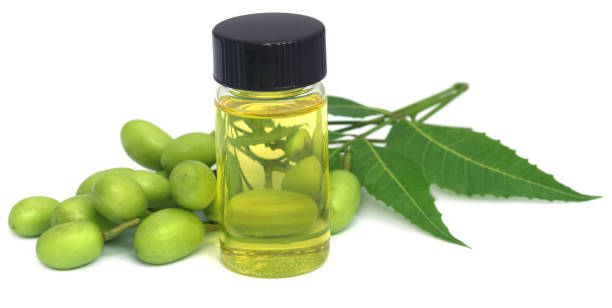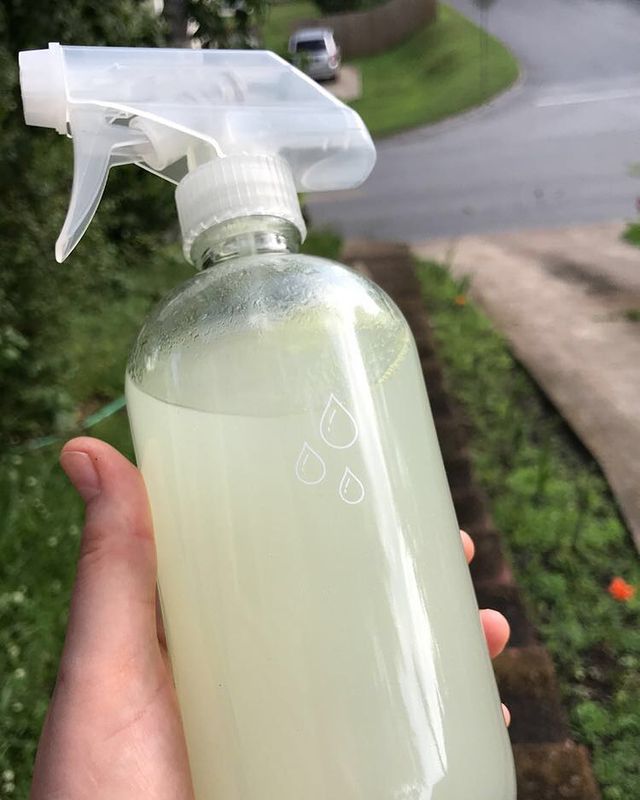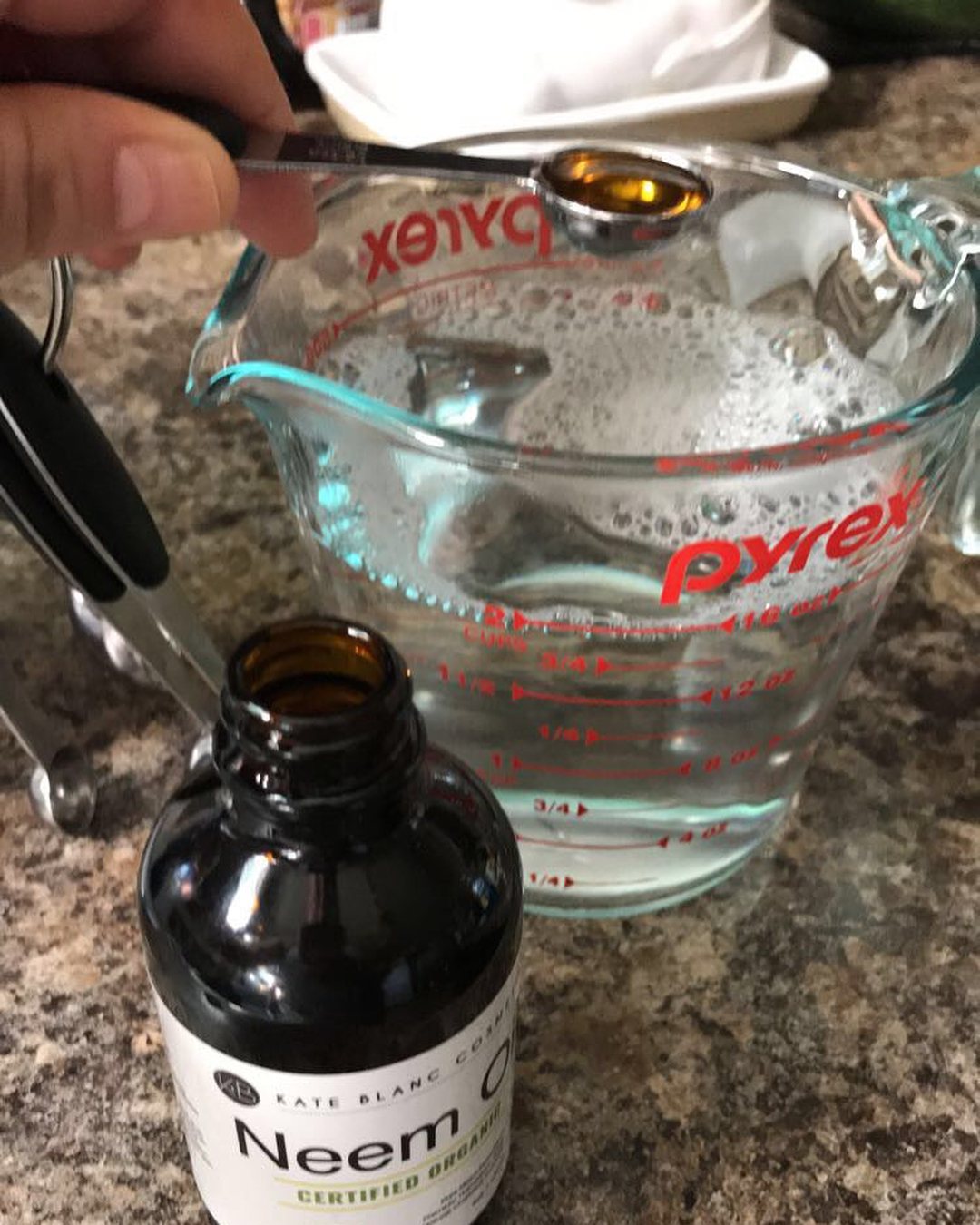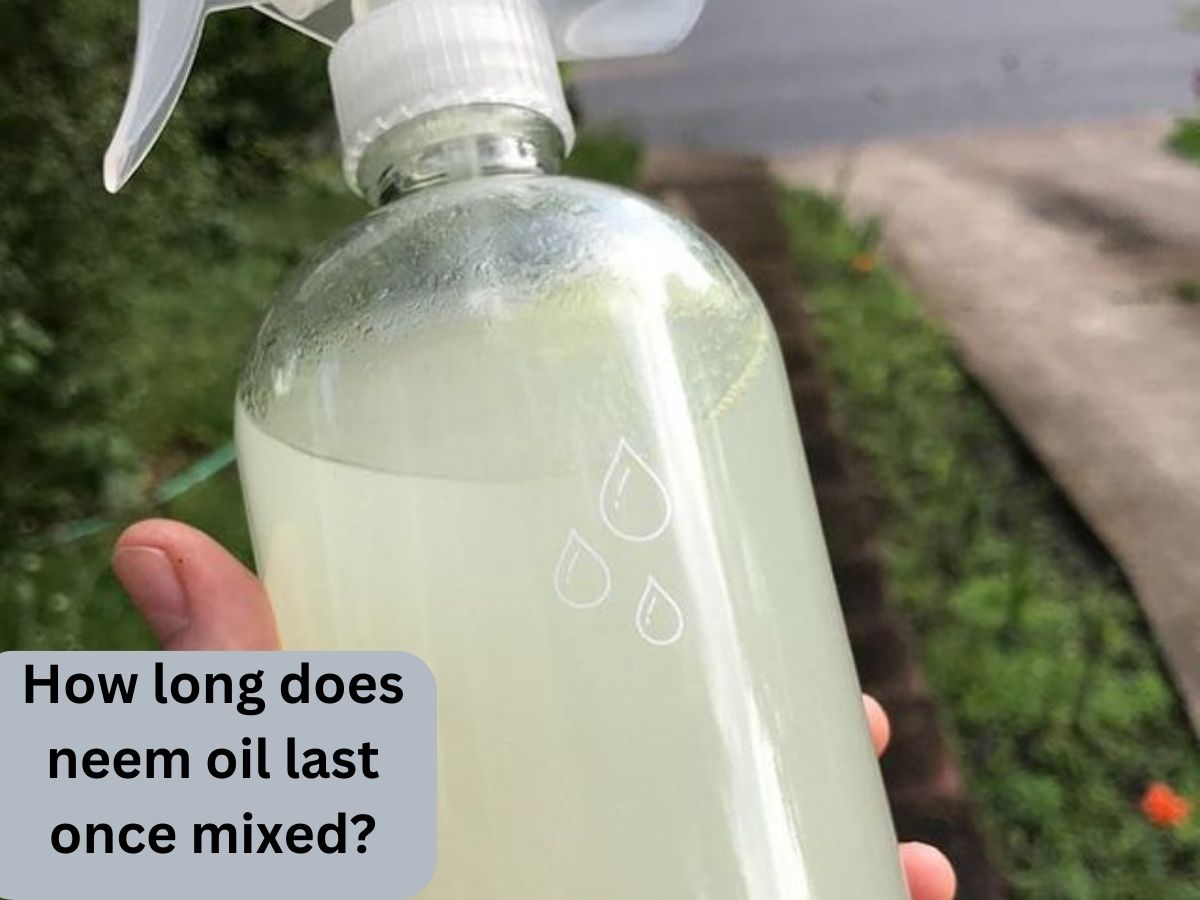Wondering how long does neem oil last once mixed? If you’ve ever explored the world of natural gardening remedies or pest control, you’ve likely come across neem oil. It’s a versatile and eco-friendly solution that’s cherished for its effectiveness against pests and its plant-nourishing properties. But here’s the kicker: neem oil, once mixed, isn’t immortal. Just like any other natural product, it has its limits.
So, how long can you count on your neem oil mixture to remain potent and do the job it’s meant to do? Generally between 8 to 12 hours, but how is it so? It’s a dynamic interplay of factors, science, and proper storage techniques that determine the longevity of your neem oil concoction.
In this article, we’re diving deep into the science behind neem oil’s lifespan once it’s been mixed with other ingredients. We’ll explore the critical factors that influence its shelf life, including temperature, exposure to light, and the type of container you use for storage.
Also, We’ll delve into the science of neem oil’s degradation and explore expert-backed recommendations on proper storage. And if you’re wondering how to tell if your neem oil has gone bad, we’ve got you covered. Recognizing the signs of expired neem oil is just as important as knowing how to extend its shelf life.
So, whether you’re a gardener looking to nurture your green kingdom or someone seeking a natural solution to pest problems, keep reading. By the end of this article, you’ll be armed with the knowledge to ensure that your neem oil mixtures remain a potent force for a long time to come.
What is Neem Oil and Why Mix It?
Neem oil, derived from the seeds of the neem tree (Azadirachta indica), is a natural and versatile product with a wide range of applications, particularly in gardening and pest control.
It has been used for centuries in various cultures for its remarkable properties. In this section, we will explore what neem oil is and why people choose to mix it with other substances.
Neem oil is a vegetable oil extracted from the fruits and seeds of the neem tree, which is native to the Indian subcontinent. The oil itself has a yellow to brownish color and a somewhat pungent, garlic-like odor.
Neem oil is a complex mixture of biologically active compounds, the most notable of which is azadirachtin, a powerful natural insecticide.

Uses in Gardening and Pest Control:
- Pest Repellent: One of the primary uses of neem oil is its role as a natural pest repellent. It’s particularly effective against a wide range of garden pests, including aphids, mealybugs, spider mites, and more. Neem oil disrupts the insects’ feeding and reproductive cycles, making it an environmentally friendly alternative to chemical pesticides.
- Fungal Disease Control: Neem oil is also known for its antifungal properties. It can help prevent and control common fungal diseases in plants, such as powdery mildew and black spots. Regular applications can inhibit fungal growth and protect your plants from these infections.
- Insecticidal Soap: Neem oil is often mixed with mild soap and water to create an insecticidal soap spray. The soap helps the oil mix with water and adhere to the plant surfaces, ensuring better coverage. This mixture is highly effective against soft-bodied insects like aphids, whiteflies, and thrips.
- Boosts Plant Health: Beyond its pest control properties, neem oil is a valuable tool for promoting overall plant health. It contains essential nutrients and compounds that stimulate plant growth and strengthen the plant’s natural defenses against diseases and pests.
Why Mix Neem Oil?
People mix neem oil with other substances, such as water and soap, for several reasons:
- Improved Application: Neem oil on its own can be quite thick and sticky, making it challenging to apply evenly. Mixing it with water and a bit of soap helps create a more manageable spray that can be evenly distributed on plant surfaces.
- Enhanced Effectiveness: Combining neem oil with soap helps the oil penetrate and suffocate soft-bodied insects like aphids. This dual-action approach increases the effectiveness of the treatment.
- Safety: Mixing neem oil with water and soap creates a milder solution that is less likely to harm plants and beneficial insects while still effectively targeting garden pests. It’s a safer and more environmentally friendly option compared to chemical pesticides.
In essence, neem oil is a valuable tool in gardening and pest control due to its natural insecticidal and antifungal properties. Mixing it with other substances, such as water and soap, not only makes it easier to apply but also allows gardeners to create customized solutions for optimal plant care and pest management.

Mixing Neem Oil
Mixing neem oil is a crucial step to ensure its efficacy in gardening and pest control. This section will guide you through the process of mixing neem oil with water or other additives, provide recommended dilution ratios for different applications, and offer tips for safe and effective mixing.
Process of Mixing Neem Oil:
- Choose the Right Neem Oil: Start by selecting a high-quality neem oil product from a reputable source. Look for cold-pressed or pure neem oil without added chemicals or solvents.
- Gather Your Materials: You’ll need a few essential items, including neem oil, a clean container for mixing, a measuring cup or spoons, a mild liquid soap (preferably organic), and water. Use clean, dry equipment to prevent contamination.
- Dilution Ratios:
- General Purpose Spray: For routine pest prevention and plant care, a 1% neem oil solution is typically effective. Mix 1 teaspoon of neem oil with 1 quart (32 ounces) of warm water. Add ½ teaspoon of mild liquid soap to help emulsify the oil.
- Heavy Infestation: If you’re dealing with a severe pest infestation, you can increase the concentration to 2% by using 2 teaspoons of neem oil per quart of water.
- Fungicide: For fungal issues, like powdery mildew, mix 1 teaspoon of neem oil with 1 gallon of water and ½ teaspoon of mild soap.
- Mixing:
- Pour the specified amount of warm water into your clean container.
- Add the measured neem oil to the water.
- Add the mild liquid soap.
- Stir or shake vigorously for a few minutes until the neem oil is fully emulsified into the water. This emulsification process ensures that the oil disperses evenly in the mixture.
- Safety Precautions: Wear gloves and eye protection while handling neem oil, especially if you’re mixing larger quantities. Although neem oil is safe for humans and pets when used correctly, it’s best to avoid direct contact with concentrated oil.
- Storage: Use the neem oil mixture immediately or store it in a dark, cool place in a tightly sealed, opaque container. Label the container with the date of mixing for reference.
Tips for Safe and Effective Mixing:
- Always follow the recommended dilution ratios to avoid over-concentration, which can harm plants and may not be more effective against pests.
- Test your neem oil mixture on a small section of your plants before applying it to the entire garden to ensure there are no adverse effects.
- Apply neem oil mixtures during the cooler parts of the day, preferably in the evening, to minimize the risk of plant damage due to sun exposure.
- Store your neem oil mixture away from children and pets in a secure location.
- Shake or stir the mixture well before each use to ensure that the neem oil remains properly emulsified.
By following these steps and precautions, you can confidently mix neem oil for various gardening and pest control applications, ensuring that your plants remain healthy and pest-free while using this natural and environmentally friendly solution.
How long does neem oil last after mixing
The shelf life of neem oil after mixing can vary depending on several factors, including storage conditions and the presence of additives like soap. In general, a neem oil mixture can remain effective for about 8 to 12 hours after mixing.
However, it’s important to note that neem oil mixtures are most potent when freshly prepared. Over time, the effectiveness of the mixture gradually diminishes as the active compounds in neem oil, particularly azadirachtin, begin to break down when exposed to air, light, and moisture.
To maximize the effectiveness of your neem oil mixture, it’s recommended to use it shortly after mixing and to prepare only the amount you need for immediate use. If you have a leftover mixture, it’s advisable to discard it rather than storing it for future use, as its potency will continue to decline over time.
Factors Affecting the Shelf Life of Mixed Neem Oil
The shelf life of neem oil after mixing can vary depending on several factors, including how it’s stored, the additives used, and the environmental conditions. Generally, neem oil mixtures can last for a reasonable period if stored properly. Here’s a breakdown:
- Storage Conditions: The primary determinant of neem oil mixture longevity is how it’s stored. Neem oil mixtures should be stored in a cool, dark place, away from direct sunlight and extreme temperature fluctuations. A pantry or a shed is often ideal. Properly sealed, opaque containers are crucial to prevent exposure to air and moisture, which can lead to degradation.
- Additives Used: The type and quality of additives used can also affect the shelf life. For example, using organic, mild liquid soap as an emulsifier tends to result in a more stable mixture compared to harsher chemicals. Additionally, some additives, like vitamin E oil, can act as antioxidants and help slow down degradation.
- Container Type: The choice of container can impact the shelf life. Use containers made of materials that won’t react with neem oil, such as plastic or glass, and ensure they have secure, tight-fitting lids. This helps maintain a sealed environment, reducing the risk of air and moisture exposure.
- Frequency of Use: If you use your neem oil mixture regularly, it’s less likely to sit around for extended periods, which can help maintain its effectiveness.
- Sunlight: Exposure to direct sunlight can break down the active compounds in neem oil and reduce its potency. It’s essential to store neem oil mixtures in opaque containers or in a dark area to shield them from sunlight.
- Air Exposure: Neem oil is susceptible to oxidation when exposed to air. Over time, contact with oxygen can lead to the degradation of neem oil’s active compounds. To mitigate this, ensure that your storage containers are airtight and minimize air contact during mixing and application.
- Duration of Storage: The longer neem oil mixtures sit unused, the more likely they are to deteriorate. If you prepare large quantities, consider using them within a reasonable timeframe to ensure effectiveness.
- Frequency of Agitation: Frequent stirring or shaking of your neem oil mixture before each use can help prevent separation and ensure that the neem oil is evenly distributed in the solution.
- Quality of Neem Oil: The quality of the neem oil itself matters. High-quality, cold-pressed neem oil is less prone to degradation compared to lower-quality variants.
Signs of Expired Neem Oil:
- Foul Odor: If the neem oil mixture develops a rancid or unpleasant smell, it’s a clear indication that it has gone bad.
- Color Change: Neem oil can darken over time, but if it becomes excessively dark or cloudy, it’s a sign of degradation.
- Texture: Expired neem oil mixtures may develop an unusual consistency, such as becoming thicker or more gel-like.
Using expired neem oil mixtures may not be as effective in pest control or plant care, and it’s best to err on the side of caution and prepare fresh mixtures when in doubt. Proper storage and monitoring for these signs can help ensure that your neem oil remains a reliable tool in your gardening and pest control efforts.

How to Store Mixed Neem Oil
Properly storing mixed neem oil is crucial to maintaining its effectiveness and prolonging its shelf life. Here are some expert tips on how to store mixed neem oil:
Storage Conditions:
- Temperature: Neem oil mixtures should be stored in a cool, stable environment. Ideally, the storage temperature should be between 40°F and 85°F (4°C and 29°C). Avoid extreme heat, as high temperatures can accelerate the degradation of neem oil. Also, prevent it from freezing, as cold temperatures can cause neem oil to solidify.
- Dark Location: Exposure to direct sunlight can break down the active compounds in neem oil. To preserve its potency, store your neem oil mixture in a dark place, away from sunlight and UV radiation. Use opaque containers or keep the mixture in a dark cabinet or pantry.
- Airtight Containers: Select containers made of materials that won’t react with neem oil, such as plastic or glass. Ensure that the containers have secure, airtight lids to create a sealed environment that minimizes air and moisture exposure. This is crucial in preventing oxidation and spoilage.
- Labeling: Clearly label your storage containers with the date of mixing. This helps you keep track of the mixture’s age, allowing you to use the oldest batches first.
- Regular Inspection: Periodically inspect your stored neem oil mixtures for any changes in color, odor, or consistency. If you notice any significant alterations, it may be time to prepare a fresh batch.
- Use Quickly: Neem oil mixtures are most effective when used relatively quickly. If you can, mix smaller quantities that you’ll use within a reasonable timeframe to maintain potency.
Safety Precautions:
- Keep Out of Reach of Children: Neem oil mixtures should be stored in a location that is inaccessible to children. Neem oil is safe when used correctly, but it should not be ingested, and children should be prevented from handling it.
- Pet Safety: Neem oil is generally non-toxic to pets, but it’s best to exercise caution. Store neem oil mixtures in areas where pets cannot access them, as some animals may be sensitive to neem oil, and ingestion could lead to mild digestive upset.
- Properly Reseal Containers: After each use, make sure to tightly reseal containers to prevent accidental spills or leaks. Even a small amount of neem oil can have a strong odor that may attract pets or wildlife.
- Dispose of Old Mixtures Safely: If you come across old or expired neem oil mixtures that you no longer wish to use, dispose of them following your local waste disposal regulations. Avoid pouring them down drains or disposing of them in a manner that may harm the environment.
By following these expert recommendations for proper storage, you can ensure that your mixed neem oil remains effective and safe for use in your gardening and pest control efforts. Maintaining the right storage conditions and taking safety precautions will help you get the most out of this valuable natural resource while keeping your home and garden safe.
What can I add to neem oil to prolong its effectiveness?
To extend the effectiveness of neem oil mixtures, you can consider adding certain additives:
- Vitamin E Oil: Vitamin E oil acts as an antioxidant and can help slow down the oxidation of neem oil, which is a common cause of its degradation. Add a few drops of vitamin E oil to your neem oil mixture during mixing.
- Mild Liquid Soap: While not necessarily extending the shelf life, mild liquid soap serves as an emulsifier, ensuring that the neem oil disperses evenly in water. This aids in even application and can enhance the effectiveness of your neem oil solution.
- Essential Oils: Some essential oils, like tea tree oil or rosemary oil, have natural preservative properties. They can complement neem oil’s insecticidal and fungicidal properties while helping to deter pests.
It’s essential to use these additives sparingly and only as needed, as adding too much of any substance can alter the balance of your neem oil mixture. Additionally, while these additives can help prolong effectiveness, they won’t make neem oil mixtures last indefinitely.
Regular monitoring and proper storage remain crucial for ensuring that your neem oil mixtures remain potent and effective for as long as possible.

Can I use neem oil that has been stored for a long time?
Using neem oil that has been stored for a long time depends on its condition. Neem oil mixtures that have been stored properly, in cool, dark, and airtight conditions, have a better chance of remaining effective for a longer period. However, even when stored correctly, neem oil mixtures may eventually degrade over time.
To determine if your stored neem oil is still usable, follow these steps:
- Check the Smell: If the neem oil has a rancid or foul odor, it’s likely gone bad and should not be used.
- Inspect the Color: Neem oil may darken over time, but if it has become excessively dark or cloudy, it’s an indication of degradation.
- Assess the Consistency: Expired neem oil mixtures may develop an unusual consistency, such as becoming thicker or more gel-like.
If your stored neem oil mixtures pass these tests and still appear and smell normal, they may still be effective, although their potency may have decreased somewhat. In such cases, you can use them, but it’s advisable to do a spot test on a small section of your plants to ensure they don’t exhibit any adverse effects.
How can I dispose of expired neem oil mixtures safely?
Proper disposal of expired neem oil mixtures is essential to prevent environmental contamination. Here’s how you can safely dispose of them:
- Contact Your Local Authorities: Check with your local waste disposal regulations and contact your municipal waste management or recycling center. They can guide the proper disposal method for household chemicals, including neem oil mixtures.
- Do Not Pour Down Drains: Never pour expired neem oil mixtures down drains or into bodies of water, as this can harm aquatic ecosystems.
- Seal the Container: If the neem oil mixture is in a container, ensure it is tightly sealed to prevent leaks during disposal.
- Household Hazardous Waste Collection: Some areas have specific collection events or facilities for household hazardous waste. If available, this can be a safe way to dispose of expired neem oil mixtures.
- Consider Dilution: If you have a small quantity of expired neem oil mixture, you can dilute it with water and then dispose of it according to local regulations. However, always check with local authorities first.
- Recycle the Container: If the container is recyclable, rinse it thoroughly before recycling it in accordance with your local recycling program’s guidelines.
By following these disposal practices, you can ensure that expired neem oil mixtures are handled safely and responsibly, minimizing any potential environmental impact.
Conclusion
Understanding how long neem oil lasts once mixed and the factors that affect its shelf life is crucial for anyone using this natural wonder in gardening and pest control. By implementing proper storage practices, you can maximize the longevity of your neem oil mixtures and ensure their continued effectiveness.
Remember to store your neem oil mixtures in a cool, dark place, away from direct sunlight and extreme temperatures. Choose airtight containers made of suitable materials to create a sealed environment that minimizes air and moisture exposure. Label your containers with the date of mixing for reference, and inspect stored mixtures periodically for any signs of deterioration.
To prolong the effectiveness of your neem oil mixtures, consider adding additives like vitamin E oil or mild liquid soap during mixing. These can help slow down degradation and improve the overall stability of your solutions.
If you ever encounter expired neem oil mixtures that are no longer suitable for use, dispose of them safely by contacting your local waste disposal authorities and following their guidelines. Avoid pouring neem oil mixtures down drains or into bodies of water to prevent harm to the environment.
By following these guidelines, you can confidently use neem oil mixtures for gardening, pest control, and various other applications, knowing that you’re making the most of this eco-friendly and versatile natural remedy. Neem oil, when handled and stored correctly, remains a valuable tool in promoting plant health and managing pests effectively.
